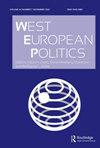Turning assertive? EU rule of law enforcement in the aftermath of the war in Ukraine
IF 3.6
1区 社会学
Q1 POLITICAL SCIENCE
引用次数: 0
Abstract
When dealing with EU’s rule of law (RoL)-related issues, the Commission has often adopted a forbearance approach and the actions taken have crystallised in soft enforcement mechanisms directed at Poland. However, the use of the Conditionality Regulation as an enforcement instrument in 2022 in relation to (lack of) RoL compliance signalled a change into an assertive approach towards Hungary. Why so? This paper argues that exogenous events may change policy priorities and linkage of issues explain this change. Russian aggression against Ukraine prompted a shift in the priorities of member states’ governments making them more receptive towards EU Commission enforcement actions. The Hungarian government’s friendly attitude towards Russia clashes with the position of most member states and the Commission itself. Orban’s partial isolation makes the Commission more willing to exercise RoL enforcement initiatives. Hence, supranational RoL-related forbearance is, at least in critical situations, affected by the calculus of opportunity that the Commission derives from other policy areas. Empirically, the process is traced through official/public documents and statements made by EU actors.把自信?乌克兰战争后欧盟的执法规则
在处理欧盟法治(RoL)相关问题时,欧盟委员会经常采取宽容的态度,所采取的行动已在针对波兰的软执法机制中具体化。然而,在2022年,使用《条件性条例》作为与(缺乏)RoL合规相关的执行工具,标志着对匈牙利采取强硬态度的转变。为什么如此?本文认为,外生事件可能会改变政策重点,而问题的联系解释了这种变化。俄罗斯对乌克兰的侵略促使各成员国政府调整了优先事项,使它们更容易接受欧盟委员会(EU Commission)的执法行动。匈牙利政府对俄罗斯的友好态度与大多数成员国和欧盟委员会本身的立场相冲突。欧尔班的部分孤立使委员会更愿意实施《罗尔法》的执法举措。因此,至少在危急情况下,与rol有关的超国家容忍受到委员会从其他政策领域得出的机会计算的影响。从经验上看,这一过程是通过欧盟参与者的官方/公共文件和声明来追踪的。
本文章由计算机程序翻译,如有差异,请以英文原文为准。
求助全文
约1分钟内获得全文
求助全文
来源期刊

West European Politics
POLITICAL SCIENCE-
CiteScore
10.00
自引率
7.10%
发文量
58
期刊介绍:
West European Politics (WEP)has established itself as one of the most authoritative journals covering political and social issues in Western Europe. It has a substantial reviews section and coverage of all national elections in Western Europe. Its comprehensive scope, embracing all the major political and social developments in all West European countries, including the European Union, makes it essential reading for both political practitioners and academics.
 求助内容:
求助内容: 应助结果提醒方式:
应助结果提醒方式:


